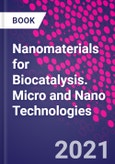Nanomaterials for Biocatalysis explains the fundamental design concepts and emerging applications of nanoscale biocatalysts, such as bioconversions, bioelectronics, biosensors, biocomputing and therapeutic applications. Nano-biocatalysts refers to the incorporation of enzymes into nanomaterials. These enzyme-enhanced nanocarriers have many advantages, including low mass transfer limitation, high enzyme capacity, better stabilization, and the formation of single-enzyme nanoparticles. Smart nanocontainers have been developed for the smart release of their embedded active substances. These smart releases can be obtained by using smart coatings as their outer nanoshells.
In addition, these nanocontainers could protect the enzymes from chemical or metabolic alterations on their delivering pathways towards the target. This is an important reference source for materials scientists and chemical engineers who want to know more about how nanomaterials are being used for biocatalysis applications.
Please Note: This is an On Demand product, delivery may take up to 11 working days after payment has been received.
Table of Contents
PART 1: BASIC PRINCIPLES1. Nanobiocatalysis: An introduction2. Nanomaterials for enzyme immobilization3. Enzyme in nanocarrierss: Mathematical modeling and simulations4. Mechanisms of interaction of enzymes and supports5. Nanomaterials based artificial enzymes
PART 2: NANOMATERIALS IN BIOCATALYSTS6. Carbon nanotubes/nanorods7. Gold Nanoparticles in biocatalysis8. Graphene oxides nanoparticles in biocatalysis9. Silica nanoparticles in biocatalysis10. Metal oxide nanoparticles in biocatalysis11. Nanostructured organic supports12. Metal organic frameworks for biocatalysis
PART 3: EMERGING APPICATIONS13. Nanobiocatalysists for Bioelectronics and Biosensors14. Nanobiocatalysists for Therapeutic applications15. Nanobiocatalysists for Biotransformations and biodegradations16. Nanobiocatalysists for Drug delivery17. Nanobiocatalysists for Biofuel cells18. Nanobiocatalysists for Stem Cell Applications19. Nanobiocatalysists for Future trends20. Current pilot scale and industrial scale up applications21. Nanobiocatalysists: Conclusion and Future trends








